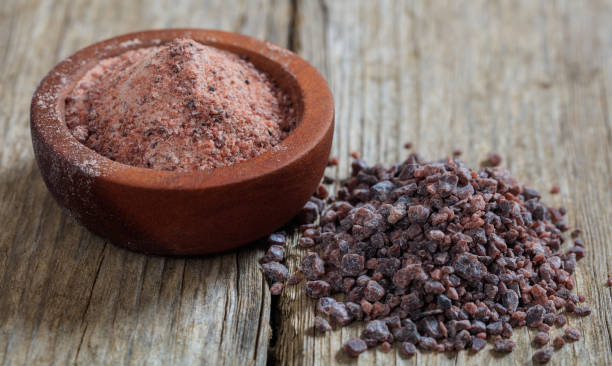Unlocking the Hidden Gem: Black Salt - Uses, Benefits, and Drawbacks
- Urvashi Kaushal

- Jul 6, 2023
- 7 min read
"Discover the unique flavor of Black Salt! This powerful seasoning is an essential ingredient for adding a unique, earthy flavor to your favorite dishes. Discover its other uses and health benefits."

In the vast world of spices and condiments, there is a hidden gem that often goes unnoticed, yet possesses a multitude of benefits and a distinct flavor that can elevate your culinary creations to new heights. This fascinating ingredient is known as black salt that has been cherished in various cultures for centuries. In this article, we will delve into the diverse uses, incredible benefits, and a few drawbacks of this remarkable seasoning. So, grab a cup of tea, sit back, and prepare to embark on a flavorful journey!
What Exactly is Black Salt?

Also known as Kala Namak or Sanchal, black salt is a type of rock salt that is typically sourced from the Himalayan regions of India, Pakistan, and Nepal. Don't be fooled by its name though, as black salt isn't actually black in color. It has a pale pinkish-gray hue, which adds a subtle touch of elegance to your dishes.
Black Salt vs. Regular Salt: Which is Healthier for You?

When it comes to comparing black salt and regular salt, it's important to note that both have their own characteristics and nutritional profiles. Here's a comparison to help you understand the differences between the two:
1. Mineral Content: Black salt, particularly the Himalayan variety, is known for its mineral content. It contains trace amounts of minerals like iron, potassium, and magnesium, which contribute to its pale pinkish-gray color. Regular salt, on the other hand, undergoes processing that removes impurities and minerals, leaving mainly sodium chloride.
2. Sodium Content: Both black salt and regular salt contain sodium, which is an essential mineral required by the body in small amounts. However, regular salt typically has a higher sodium content compared to black salt. Excessive sodium intake can contribute to health issues like high blood pressure and heart disease. Therefore, it's important to monitor your sodium intake from all sources, including salt.
3. Taste and Flavor: Black salt has a distinctive flavor profile, often described as slightly sulfurous and tangy, reminiscent of boiled eggs. It is commonly used to add an egg-like flavor to vegan and vegetarian dishes. Regular salt, on the other hand, has a more neutral taste. The choice between the two depends on personal preference and the desired flavor profile in your recipes.
4. Culinary Applications: Regular salt is a staple in cooking and baking, providing basic seasoning and enhancing flavors. It is widely used in various cuisines and recipes. Black salt, on the other hand, is more commonly used in specific culinary applications, such as vegan and vegetarian dishes, certain snacks, and fruit salads, to add a unique taste and aroma.
5. Overall Nutritional Value: While black salt contains trace minerals, its nutritional impact is minimal due to the small quantities typically used in recipes. Regular salt does not offer significant nutritional benefits apart from its sodium content. To obtain a wide range of essential nutrients, it's important to focus on consuming a balanced diet that includes nutrient-rich whole foods.
Ultimately, the choice between black salt and regular salt depends on personal taste preferences, dietary needs, and specific culinary applications. Both should be used in moderation, keeping in mind the recommended sodium intake guidelines provided by health authorities. If you have specific health concerns or dietary restrictions, it's advisable to consult with a healthcare professional or registered dietitian for personalized advice.
Creative Ways to Use Black Salt: Culinary and Non-culinary Applications

A versatile seasoning with a range of uses in culinary and non-culinary applications. Let's explore its various uses:
1. The Must-Have Ingredient for Vegan and Vegetarian Cooking
Vegan and Vegetarian Dishes:
Black salt is widely used in vegan and vegetarian cuisines as it imparts a distinctive egg-like flavor. It is often used in tofu scrambles, vegan omelets, eggless salads, and other plant-based dishes to replicate the taste of eggs.
Chaats and Snacks:
Black salt adds a tangy and savory element to popular Indian street foods like chaats (e.g., bhel puri, papdi chaat) and snacks. It enhances the overall flavor profile, giving them an authentic and delicious taste.
Raitas and Chutneys
It can be sprinkled on yogurts, raitas, and chutneys to add a hint of tanginess and depth of flavor.
Fruits and Salads
A pinch of black salt on fresh fruits like watermelon, mango, or pineapple can elevate their taste, adding a unique sweet and savory contrast. It can also be used in salads to enhance the overall flavor profile.
2. A Natural Remedy for Digestive Issues
Black salt is known for its digestive properties and is used as a natural remedy for digestive issues like bloating, indigestion, and constipation. It can stimulate the production of digestive juices, aiding in better digestion.
3. Black Salt as a Powerful Detoxifying Agent
During hot summer months, black salt is often used in beverages like lemonade, buttermilk, or flavored water to provide a cooling effect. It helps in preventing dehydration and replenishing electrolytes.
4. Ayurvedic and Herbal Remedies
In Ayurveda, black salt is considered to have medicinal properties. It is used in various herbal remedies for treating ailments like arthritis, acidity, heartburn, and respiratory problems.
5. Beyond the Kitchen: Surprising Uses of Black Salt in Beauty and Skincare

Black salt is sometimes incorporated into beauty and skincare products. It can be used in scrubs and exfoliants to remove dead skin cells and promote smooth, healthy-looking skin.
While these are some common uses of black salt, it's worth noting that the specific applications can vary across different culinary traditions and cultural practices. It's always recommended to start with a small amount and adjust according to taste preferences. Black salt truly is a versatile seasoning that adds a unique flavor and dimension to a wide range of dishes, making it a must-have ingredient in any kitchen.
The Health Benefits of Black Salt and How to Incorporate it Into Your Diet

The Sanchal offers several health benefits due to its mineral content and unique properties. Here are some of the key health benefits associated with black salt:
1. Electrolyte Balance
Black salt contains essential minerals like sodium, potassium, and magnesium, which are crucial for maintaining proper electrolyte balance in the body. Electrolytes help regulate hydration, nerve function, muscle contractions, and overall cell function.
2. Iron Source
It is a good source of iron, an essential mineral necessary for the production of red blood cells. Iron plays a vital role in transporting oxygen throughout the body, preventing anemia and boosting energy levels.
3. Respiratory Health
In Ayurvedic medicine, black salt is sometimes used to alleviate respiratory conditions like asthma, bronchitis, and allergies. It is believed to have expectorant properties, helping to relieve congestion and promote easier breathing.
4. Digestive Alkalizer
Despite its name, black salt has an alkalizing effect on the body. It can help balance the pH levels in the stomach, reducing acidity and preventing acid reflux.
It's important to note that while black salt offers certain health benefits, it should be consumed in moderation like any other seasoning. Additionally, individuals with specific health conditions, such as hypertension or those on a low-sodium diet, should exercise caution and consult with a healthcare professional before incorporating black salt into their diet.
Unveiling the Hidden Side Effects of Consuming Black Salt

While black salt offers various benefits, it also has a few drawbacks that should be taken into consideration. Here are some potential drawbacks of black salt:
1. High Sodium Content: Like regular table salt, black salt contains sodium. Excessive sodium consumption can contribute to high blood pressure and increase the risk of heart disease and stroke. Individuals with hypertension or those on a low-sodium diet should be cautious and moderate their intake of black salt.
2. Restricted Use for Some Health Conditions: Due to its sodium content, individuals with certain health conditions, such as kidney problems or edema, may need to limit their consumption of black salt. It's advisable to consult with a healthcare professional to determine the appropriate amount of sodium intake for your specific needs.
3. Sulfur Smell: The distinct aroma of black salt, which some describe as sulfurous or resembling boiled eggs, may not be appealing to everyone. If you are sensitive to strong odors or find the smell off-putting, it may not be the ideal seasoning for you.
4. Limited Nutritional Value: While black salt contains trace minerals like iron, potassium, and magnesium, it is not a significant source of these nutrients. Relying solely on black salt for meeting your nutritional needs would not be sufficient, and a balanced diet including a variety of nutrient-rich foods is recommended.
5. Allergies or Sensitivities: Some individuals may have allergies or sensitivities to black salt or the minerals it contains. If you have a known allergy or sensitivity to certain salts or minerals, it's important to exercise caution and avoid black salt or seek medical advice.
As with any dietary ingredient, it's essential to consume black salt in moderation and be mindful of your individual health circumstances. If you have any concerns or specific dietary requirements, it's always recommended to consult with a healthcare professional or registered dietitian for personalized guidance.
Remember, while black salt can add flavor and depth to your culinary creations, it's just one component of a balanced and varied diet. Embrace a holistic approach to nutrition and make informed choices based on your unique needs and preferences.
In a Nutshell
In conclusion, black salt is a treasure trove waiting to be discovered. Its distinct flavor profile and versatile nature make it a valuable addition to any kitchen. Whether you are a seasoned chef experimenting with flavors or an enthusiastic home cook looking to add a dash of excitement to your meals, black salt is a must-try ingredient. From vegan creations to traditional Indian dishes, its tangy, sulfurous notes will leave you craving for more.
Remember, as with any spice or condiment, balance is key. Embrace the unique taste and reap the benefits of black salt, but do so in moderation. So, go ahead and embark on this flavorful journey, and let black salt be your secret ingredient to unlocking a world of culinary delights. Bon appétit!




Comments